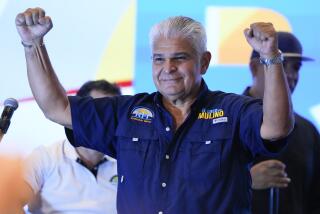Guatemala’s new leader inherits woes
GUATEMALA CITY — Alvaro Colom awoke Monday to the realization that an entire country of poor and desperate people was depending on him.
Having won Guatemala’s presidential election Sunday night, Colom will inherit a series of seemingly intractable problems when he takes office Jan. 14.
Guatemala is one of the most troubled societies in Latin America. Thousands of its citizens migrate to the United States in search of work each year. Organized-crime groups have infiltrated many key government institutions.
“The people of Guatemala voted for change. We will do everything we can to give it to them,” said Colom, a slim 56-year-old engineer.
In a news conference and subsequent interview with The Times, Colom said his government would undertake a series of efforts to improve the lives of the country’s Maya population. Long Guatemala’s poorest residents, the Mayas voted overwhelmingly for Colom.
“We have a historic debt with our indigenous people,” Colom said. “Our government will be one with a Mayan face.”
Colom said he also planned to reach out to the millions of Guatemalans who live in the United States. The Guatemalan government will work to provide more services to its citizens who live abroad, including assistance to families that wish to return the bodies of those who die far from home.
The Guatemalan consulate in Los Angeles, which serves hundreds of thousands, will be expanded, Colom said. And he will back a measure to provide Guatemalans abroad with the right to vote in their homeland.
“The level of civic activism of the Guatemalans in the United States is much higher than it is here,” Colom said.
Colom won Sunday’s presidential election in the rural villages where more than 20 different Mayan languages are spoken, humble places where the people feel distant from their largely Spanish-speaking government.
One of his first meetings as president-elect, he said, would be today with the Council of Elders, a group of Maya leaders. Colom met the elders during his previous work as director of the government’s National Fund for Peace, a development agency.
“Few Guatemalans know the Council of Elders exists, but they’re so powerful they can provoke uprisings,” said Colom, who is also one of the few non-Indians to be trained in the rites of Maya shamans.
“We need to learn to live together,” Maya and non-Maya, he said. “People see the existence of so many cultures in our country as a threat. But it’s a resource and source of strength.”
In Sunday’s election, rival Otto Perez Molina beat Colom by a large margin in Guatemala City and its suburbs, home to one in four voters. But Colom won in all but one of the country’s 21 provinces.
Nationwide, Colom defeated Perez Molina by 52.8% to 47.2%, according to final results released Monday.
Political analysts said it was the first time in Guatemalan history that a candidate had won a presidential election by carrying the countryside while losing in the capital.
Perez Molina, a former army general, won the urban vote by calling for a “firm hand” against the crime wave sweeping the country, and said he would use the military to crack down on organized crime. Many feared that a Perez Molina victory would mean a return to authoritarian government.
Guatemalan voters rejected his message. But analysts said that Colom would face a series of challenges as he attempts to rule this country of 13 million people.
“One day, the United States is going to stop the flow of migrants,” said Edgar Gutierrez, director of a human-rights think tank here. “If Colom doesn’t develop a regional strategy that seeks an immigration reform in the U.S., and if he doesn’t invest in the problem of unemployment, he’s going to have serious problems.”
Colom, a self-described social democrat, said investment in the rural economy was desperately needed to stop emigration. He said he would implement a little-used provision of the 1996 peace accords that ended Guatemala’s civil war, one that allows the government to buy property to redistribute to landless farmers.
The president-elect also proposed the creation of a fund tied to the millions of dollars in remittances that Guatemalans send home each year from the United States. Many community groups in the United States pay for schools and other projects in their Guatemalan hometowns with remittances. The government should match those contributions, Colom said.
“We have to close the spigot that is producing emigration,” he said. “Our dream is to generate the conditions so that people don’t give in to the temptation to migrate.”
--
Special correspondent Alex Renderos contributed to this report.
More to Read
Sign up for Essential California
The most important California stories and recommendations in your inbox every morning.
You may occasionally receive promotional content from the Los Angeles Times.











